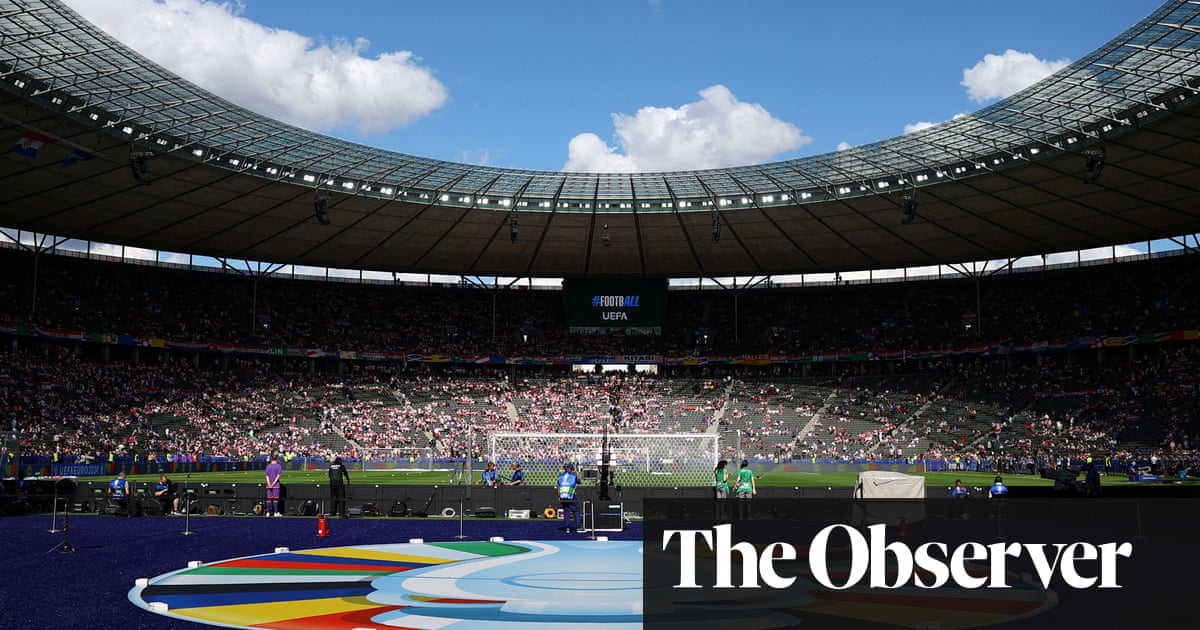Multicultural final of Euro 2024 stands against murky history of Berlin stage

The stage is set for Sunday’s European Championship final between Spain and England, a drama of historic proportions, on a stage which is no stranger to history. Expected to attract an audience of more than 300 million in addition to the 71,000 spectators who will be packed under its rafters, there is no commentator nor player who will be easily able to ignore its murky past.
Built and financed on the orders of the Nazi dictator Adolf Hitler for the 1936 Games, Berlin’s Olympiastadion might have been pulled down years ago. That it is still standing is due to the pledge made to “clarify rather than obscure” that past, what Germans refer to as the process of Vergangenheitsbewältigung, a head-on confrontation with its history.
It is hard to look at the box of honour at the gargantuan neo-classical complex west of Berlin (which was shortened to a more modest size in the 1950s) and not conjure up images of Hitler and his myriad henchmen, looking on. We’ve seen the documentaries, in particular and probably most memorably, Leni Riefenstahl’s propagandistic Olympia.
Preparation for the games included getting rid of any indication of what Hitler had in store, and instead presenting the Nazis at their warmest and friendliest. It was a charm offensive to the world and most were taken in by it. Hand-picked Jewish athletes were allowed to participate, Nazi publications were banned from the streets, signs restricting Jews in daily life were removed. At the same time, beyond the city’s borders, concentration camps were under construction, the Rhine was being remilitarised and Roma and Sinti were cleared out of the city and deported to camps, as part of the mass “clean up” operation.
But not everything went to plan. Hitler reportedly reacted with disgust after seeing the black American Jesse Owens become the most successful athlete at the Games. Owens, who won four gold medals, was celebrated by anti-racist campaigners for single-handedly macerating Hitler’s bogus Aryan supremacy theory with his prowess.
It is fitting then, that 88 years on it will be two multicultural teams who are battling it out on the same ground, making Europe’s right-wing populists squirm perhaps as much as Hitler did.
It has been listed since the 1960s, and was thoroughly renovated at a cost of €242m in time for the 2006 World Cup. The swastikas which once hung from the Olympiastadion’s portals are long gone, but visitors are still met by many unavoidable details that point to its legacy as a Nazi temple.
Bronze statues are a nod to the myth of the master race theory on which Nazism was based, the Franconian shell limestone personally chosen by Hitler still clads its exterior walls, the austere and overbearing colonnades remain, as do two of six towers representing the “mighty German tribes”.
The bleak and imposing Olympic cauldron – the Nazis introduced the torch relay to the games – is also unavoidably a symbolic reminder of the subsequent Nazi conflagration which engulfed the whole of Europe. Information panels are dotted around the complex, and guided historical tours are on daily offer.
after newsletter promotion
Used during the second world war for everything from a bunker complex to weapons production and broadcasting, after 1945 the edifice was briefly inhabited by the Russian Red Army, and when the city of Berlin was partitioned by allied forces and the district of Charlottenburg, home to the stadium, became part of the British sector during the Cold War, the British Army moved in.
It was they who tweaked the architecture, within the framework of wider efforts to de-Nazify the country, shrinking the bombastic Hitler balcony, removing the swastikas, and opening the Olympic swimming pool to the public, in an effort to return the space to the people. An extension of this was making it home to the football club, Hertha BSC in 1963. A canopy roof was installed in 1974, giving shelter to 26,000 fans in time for the 1974 World Cup, and later extended for the tournament 32 years later. Modern floodlit lighting was also added as well as a striking blue tartan track.
Although Owens’ multiple triumphs are the most celebratory historical event to have taken place, the Olympiastadion has also hosted the Rolling Stones, and been witness to Zinedine Zidane’s head butt in the 2006 World Cup final, Usain Bolt’s record-breaking 100 metres at the 2009 World Athletics Championship, and South African Caster Semenya’s victory in the 800 metres, defining years of controversy over gender and sport.
The stadium is soon once again expected to undergo a transformation, amid plans by Hertha to move out, and a considerable amount of lobbying taking place for it to be officially designated the German football association’s national arena.
Related
A New Book Argues That What Happens in Europe Doesn’t…
Remaking the World: European Distinctiveness and the Transformation of Politics, Culture, and the Economy by Jerrold Seigel “No issue in world
Poland plans military training for every adult male amid growing…
Poland’s prime minister, Donald Tusk, has said his government is working on a plan to prepare large-scale military training for every adult male in response t
2025 European Athletics Indoor Championships: Ditaji Kambundji secures women’s 60m…
Switzerland’s Ditaji Kambundji walked away from the 2025 European Athletics Indoor Championships in Apeldoorn on 7 March with much more than her first Europea
Takeaways from the EU’s landmark security summit after Trump said…
BRUSSELS (AP) — European Union leaders are trumpeting their endorsement of a plan to free up hundreds of billions of








